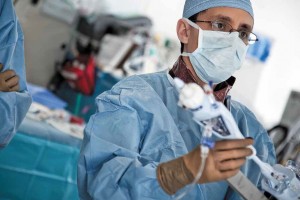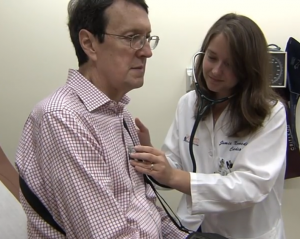Clinical
Division of Cardiovascular Medicine:
CLINICAL
The UVA cardiovascular program continues to expand its national reputation while growing areas of excellence and innovation, increasing patient access to providers, and strengthening its focus on quality and safety. Cardiovascular physicians are renowned in the area of non-invasive cardiac imaging, where new modalities are invented, not just tested, and an expanded percutaneous valve program has gained national recognition. The internationally known electrophysiology section recently acquired the Sensei robotic catheter system, providing significant enhancements to maneuver catheters into difficult-to-reach places in the heart. Faculty additions in vascular medicine and vascular intervention have positioned the division for growth in this core service line; an urgent care clinic has eased access to cardiovascular physicians by allowing acute heart patients to bypass the emergency department; and UVA’s new outpatient clinics to the north, east and west of Charlottesville have expanded the division’s clinical footprint.
Atrial fibrillation, a condition in which the heart beats irregularly (either too fast or too slow), affects an estimated 3 million people in the U.S. and leads to a fivefold increase in risk for stroke. The division’s Atrial Fibrillation (“Afib”) Center, directed by electrophysiologist Mike Mangrum, continues to be at the international forefront of A-fib patient care, education, and research. UVA was the first site to implant an FDA-approved pacemaker for patients with congestive heart failure and A-fib in 2004; more recently, Mangrum was the first physician in the U.S. to use the newest type of ablation catheter, which assesses contact inside the heart chamber. UVA is also a major contributor to most clinical trials in this area, offering additional treatment options to patients. Mangrum and his colleagues are seeking to revolutionize the understanding and treatment of the condition at the AFC by creating an atrial fibrillation institute that would bring together interrelated disciplines to better understand the causes of A-fib, develop and implement innovative treatments, and assure the best care for patients. Private support is needed to make this program a reality. “UVA is poised and ready to become the national and international leader in research, education, and comprehensive treatment of atrial fibrillation,” Mangrum says. “We have the expertise, the collaboration, and the clinical foundation to create an institute that will bring together the best minds across the globe to focus on A-fib.”
In May 2014, the division’s Ventricular Assist Device (VAD) program completed a successful review by Joint Commission (JCAHO), with its “disease specific care certification” renewed. The surveyor remarked on “the culture of safety at UVA,” and applauded the high level of dedication she observed in caring for this distinct patient population. The patients the surveyor interviewed were highly complimentary about the care they received, and she was impressed not only with the program team, but also with the level of support and engagement that all staff demonstrated in caring for these patients.
Interventional cardiologist Scott Lim is on the forefront of an innovative, minimally invasive, method of repairing the mitral valve, using a device called a mitral clip. A clinical trial of the device has found that it is the first effective treatment for patients who are at high risk for standard open-heart surgery for a leaking heart valve. The results of the trial were published on-line in the Journal of the American College of Cardiology in October 2013, followed by print publication in July 2014.


